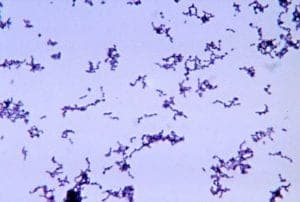A new understanding of the root cause of acne, specifically how we house the bacteria that triggers inflammation in the skin, could help researchers in developing new treatments.
Acne occurs when natural oils and dead cells build up around your hair follicles, creating a hotbed of bacteria growth. This infection sets off your immune system, which leads to inflammation, redness and pimples. The Propionibacterium acnes bacteria, or P. acnes, is the root cause of this condition.

P. acnes usually lives harmlessly on the skin, but a new study in the journal Science Immunology explains how its presence in your immune system sends it spiraling out of control. Certain bacteria produce chemicals called short-chain fatty acids (SCFAs). These acids block the action of an immune compound called histone deacetylase (HDAC). Suppressed HDAC can lead to immune problems and inflammation.
Researchers wanted to see if the same patterns would play out on and inside the skin. They recreated a greasy skin experience by culturing acne bacteria in Petri dishes full of blood cells or oil-producing cells. This SCFA sample was applied on and under the skin of lab mice.
Related: Acne-Causing Bacteria Might Also Fight Skin Disease
The results showed the top most layer of keratinocytes, the most common type of epidermal cells, became inflamed. But exposing the lower skin layers to acne and SCFA activated those cells’ immune systems and caused the areas to fight off infection.
The study revealed that P. acnes is not just the root cause of acne, but the presence of the bacteria itself provides insight in regard to how our skin can change at the genetic level.
Even though the study was conducted in mice, researchers hope to do similar tests with people, with the ultimate goal of creating new treatments for acne.
“If we get lucky, it could lead to new medications in two to five years,” Dr. Richard Gallo told New Scientist. Gallo, the lead researcher on the study, is the interim Chair of Dermatology at the University of California, San Diego.
Related: Probiotic Cream Made From Body’s Own Bacteria May Cure Eczema
Ronke Idowu Reeves is a writer and journalist who hails from Brooklyn, NY. Her news and entertainment stories have appeared on WABC-TV-New York, Fox News Channel, VH1, BET.com plus in Sundance Film Festival’s Sundance Daily Insider and People Magazine.


![How To: ‘Fix’ Crepey Skin [Watch]](https://cdn.vitalupdates.com/wp-content/uploads/2017/05/bhmdad.png)












